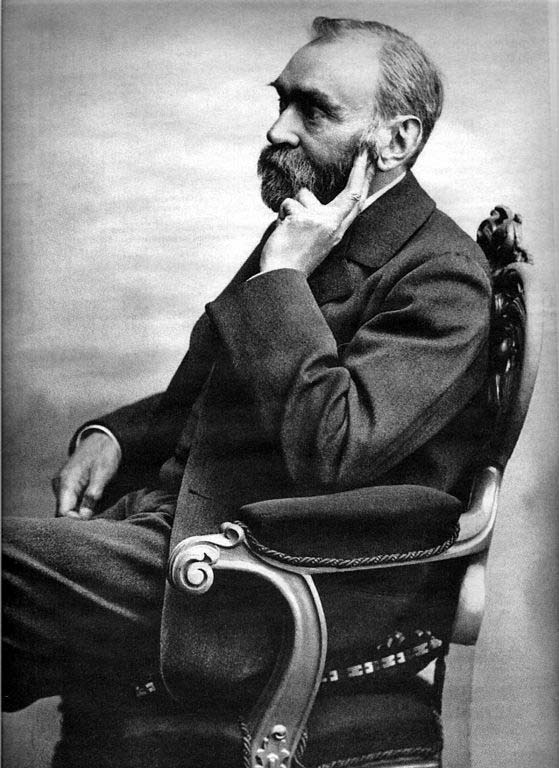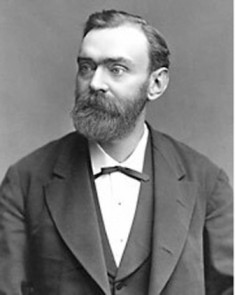| Alfred Nobel | |
|---|---|
 |
|
| Inventor of Dynamite | |
| Specialty | Innovator, engineer, chemist, arms manufacturer |
| Born | Oct. 21, 1833 Stockholm, Sweden |
| Died | Dec. 10, 1896 (at age 63) Sanremo, Italy |
| Nationality | Swedish |
Alfred Nobel was a Swedish scientist, particularly in the field of chemistry, and a manufacturer of armaments. He secured about 350 patents, of which the most important was that for the explosive, dynamite, which he invented. His industrial activities included owning the Bofors Company, which became an important player in the cannon-manufacturing industry. Nobel left money in his will to set up what became known as the Nobel Prizes. The artificially synthesized element nobelium is named in his honor.
Nobel’s Early Life
Nobel was born in the Swedish capital of Stockholm on October 21, 1833. The third of four children, he was the son of a wealthy arms manufacturer and engineer who hoped that his sons would follow him into the mechanical industry. In 1842, the Nobel family moved to St. Petersburg in western Russia, so that his father could set up a factory for the manufacture of torpedoes.
The young Alfred was mostly educated privately by a succession of tutors who were employed by his father. He was taught chemistry by Professor Nikolay Zinin, who instilled a fascination with the science in the boy.
Furthering His Studies
When Nobel was 18, he went to the United States to continue his chemical studies. This took him four years, during some of which time he worked as an assistant to John Ericsson. Nobel traveled to France, and while in Paris he first came into contact with nitroglycerin.
This substance, which would eventually form the basis of dynamite, was an explosive and volatile liquid that had been synthesized for the first time in 1847 by Ascanio Sobrero. However, the company run by his father had got into difficulties after its primary source of income – supplying arms for the Crimean War – was cut off with the end of that conflict.
Development of Explosives
The family fell into near-poverty, relying on Nobel’s mother’s income from her job at a grocery store for support. Nobel himself decided to continue his studies into nitroglycerin, and explosives in general, with a view to discovering a method of controlling explosions more exactly.
For several years he was unable to find a solution, but in 1863 he managed to use a charge of gunpowder to explode nitroglycerin remotely. After working on the matter for two more years, in 1865, he secured the patent for a mercury fulminate detonator; this was a major advance in the development of high explosives.
Rise to Fame and Controversy
 Following his discoveries and inventions, Nobel rapidly became both famous and wealthy, and before long he had opened factories in Stockholm and Hamburg. He soon expanded into the United States with plants in California and New York.
Following his discoveries and inventions, Nobel rapidly became both famous and wealthy, and before long he had opened factories in Stockholm and Hamburg. He soon expanded into the United States with plants in California and New York.
Although these were generally successful, their safety record was not particularly good, and a number of serious accidents occurred, particularly when explosives were in transit. This made Nobel a controversial figure, especially after an incident at the Stockholm plant in 1864. This explosion resulted in the deaths of a number of workers, among whom was Emil, Alfred Nobel’s younger brother.
Inventing Dynamite
Shocked by his brother’s death, and realizing how much damage had been done to his company’s reputation by these incidents, Nobel worked tirelessly to come up with a safer type of explosive. In 1866, he made his breakthrough, discovering that nitroglycerin was less dangerous it if was encased in a type of porous clay.
He received a patent for this new substance, which he named dynamite, the following year. Shortly afterward, Nobel carried out the first public demonstration of dynamite, at a quarry close to the English town of Redhill. He gradually refined his invention and soon produced a more powerful variant, formed by using sodium nitrate and wood pulp to absorb the nitroglycerin, which he called gelignite.
Nobel’s Legacy and Death
Nobel was keen that his fortune, which was by the 1890s very substantial, should give him a legacy which would assist other scientists. When he wrote his will in 1895, he stipulated that a large sum of money should be used to set up a body to award Nobel Prizes. These would be available to scientists from all over the world.
While visiting Italy, Nobel suffered a stroke on December 10, 1896, which caused his death. His executors set up the Nobel Foundation to carry out his wishes regarding the prizes, and the first of them were awarded in 1901. They remain the most prestigious awards available in the branches of science for which they are given.